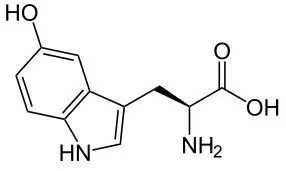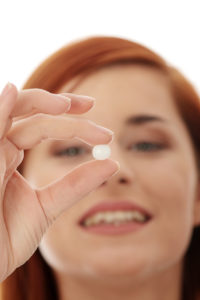Table of Contents
5-HTP (5-Hydroxytryptophan or oxitriptan) is an amino acid that is naturally produced in your body. 5-HTP is synthesized from the amino acid tryptophan which we get from food.
5-HTP is the immediate precursor of serotonin. And as a nootropic and dietary supplement, 5-HTP is popular with those who advocate its effectiveness in treating depression. Along with a number of other serotonin-related diseases.
But using 5-HTP for treating depression and anxiety is not supported by science. The research is contrary to how 5-HTP is viewed by many, including medical doctors.
When we dig into the research, we find that 5-HTP may be contraindicated for depression in those whom marketers advocate its use.[i]
We’re all for boosting neurotransmitter levels and optimizing cognitive performance here at Nootropics Expert®. But now and again I run into a nootropic or dietary supplement that may be popular. But also may be a particularly bad idea.
We’re going to get to the bottom of how 5-HTP works in your brain in this review. We’ll examine why it’s critical for brain health. And reasons why you may want to find another way to boost serotonin levels in your brain.
5-HTP helps:
- Anxiety & Depression. 5-HTP is synthesized into serotonin in brain cells. Elevating levels of serotonin can help relieve the symptoms of anxiety and depression.
- Neurotransmitters. 5-HTP is a necessary ingredient for serotonin synthesis which boosts mood and social behavior, improves memory, regulates appetite and digestion, sleep, sexual desire and function.
- Brain Optimization. A critical balance of the primary neurotransmitters serotonin and dopamine are needed for the highly optimized brain. When these neurotransmitters are not in balance it affects mood, memory, cognition, decision-making, sexual desire, and a host of other critical life functions.
What is 5-HTP?
5-HTP (5-Hydroxytryptophan or oxitriptan) is an amino acid that’s synthesized from the essential amino acid tryptophan.

Tryptophan is hydroxylated by tryptophan hydroxylase to 5-HTP (5-hydroxytryptophan), then decarboxylated to serotonin (5-hydroxytryptamine or 5-HT).[ii]
Tryptophan → 5-HTP → serotonin
80-90% of your body’s serotonin is made in your intestines. But serotonin cannot cross the blood-brain barrier. So all the serotonin that your brain needs has to be made within the brain. This is where 5-HTP comes in…
5-HTP crosses the blood-brain barrier more readily than tryptophan. And gets synthesized into serotonin at a faster rate than from tryptophan.[iii]
As a neurotransmitter, serotonin influences directly and indirectly, the majority of brain cells. So if you want to boost serotonin in your brain, some find that supplementing with 5-HTP is better than taking tryptophan.
Tryptophan, which your body uses to make 5-HTP, can be found in turkey, chicken, milk, potatoes, pumpkin, sunflower seeds, turnip and collard greens, and seaweed.
5-HTP as a nootropic supplement is a naturally occurring amino acid derived from seed pods of Griffonia simplicifolia, found in West and Central Africa. 5-HTP content in extracts of this plant vary from 2 – 20.83% (from seeds obtained in Ghana).[iv]
How does 5-HTP work in the Brain?
5-HTP is a precursor to serotonin. The neurotransmitter serotonin plays a role in sleep, appetite, learning & memory, mood, and sexual function.
When tryptophan’s role in converting to 5-HTP for boosting serotonin doesn’t work efficiently, the result is often depression, chronic headache and insomnia.
An open-label trial was conducted in Italy to determine the efficacy of using 5-HTP in young subjects with high levels of “romantic stress”.
Serotonin has been linked to human romantic attachment. So researchers in this study set out to determine brain levels of Brain-Derived Neurotrophic Factor (BDNF) and serotonin in relation to changes in romantic stress during the study.
15 healthy subjects (mean age 23.3 years) who had a “romantic breakup” took part in the study. Participants received 60 mg of Griffonia simplicifolia extract containing 12.8 mg 5-HTP daily for 6 weeks.
The subjects were evaluated for BDNF and serotonin levels at the beginning of the study, at 3 weeks and then again at the end of the 6-week trial.
The scientists observed significant improvements in romantic stress scores from weeks 0 through 3. So far, 5-HTP seems to be working. But no further improvement was seen from weeks 3 through 6. Even though the young people had significantly higher levels of BDNF and serotonin.[v]
More Involved in Depression and Stress than Serotonin
This “romantic breakup” study is a classic illustration of why using 5-HTP alone to treat depression and stress may not work. And if it does work, why it may not work for long.
Depression is often more than simple serotonin dysfunction. Depression can also be associated with catecholamine dysfunction, including dopamine and/or norepinephrine. Or a combination of serotonin and catecholamine dysfunction.
When you take 5-HTP alone, you are also depleting dopamine, norepinephrine, and epinephrine. Synthesis of serotonin from 5-HTP, and dopamine from L-DOPA is catalyzed by the same enzyme, L-aromatic amino acid decarboxylase (AAAD).
Dopamine and serotonin precursor supplementation must be taken in proper balance. Because when you use only 5-HTP, it dominates dopamine at the AAAD enzyme synthesis level.
Blocking dopamine synthesis at the AAAD enzyme through competitive inhibition will lead to depletion of dopamine and the rest of the catecholamines.[vi]
Going back to our Italian study of young people dealing with “romantic stress”, the subjects stopped responding to 5-HTP in the 2nd half of the study. Likely because their catecholamines became depleted through continuous 5-HTP supplementation.
Studies have found that when dopamine is depleted enough, 5-HTP will no longer function.[vii]
Catecholamine Dysfunction Affects More Than Just Depression
When catecholamine neurotransmitter levels (dopamine and/or norepinephrine) influence depression, supplementing with 5-HTP alone is not the way to go. Because you may deplete dopamine and norepinephrine, worsening the disease and its underlying cause.
But this contraindication is not exclusive to depression. It extends to all other diseases where catecholamine dysfunction has been implicated. Including ADHD[viii], obesity, anxiety, seasonal affective disorder (SAD), and Parkinson’s Disease.[ix]
How things go bad
 Amino acid precursors of serotonin (i.e. 5-HTP) and dopamine (i.e. L-Tyrosine) work together during synthesis, metabolism and transport to the point that they function as one system.
Amino acid precursors of serotonin (i.e. 5-HTP) and dopamine (i.e. L-Tyrosine) work together during synthesis, metabolism and transport to the point that they function as one system.
When serotonin and dopamine are properly balanced, functions that are regulated only by serotonin, can be regulated by manipulating dopamine levels. And functions regulated only by dopamine in this balanced state can be regulated by manipulating serotonin.[x]
When you mess with this balance and improperly supplement with serotonin or dopamine precursors, you don’t get the desired effect of using that nootropic. And you increase the possibility of side effects with too much serotonin.
If you supplement with only one precursor (i.e. 5-HTP to boost serotonin) that dominates the other system (i.e. dopamine synthesis), depletion of the dominated system will occur (i.e. depleted dopamine).
And if this effect is pronounced enough, you will not get the benefit you were aiming for when supplementing with the original precursor (i.e. 5-HTP).
A powerful example of this effect is in the management of Parkinson’s Disease where the effects of L-DOPA are no longer observed over time due to serotonin depletion.[xi]
Since serotonin and dopamine cannot cross the blood-brain barrier, the number of serotonin and dopamine molecules in the brain is a function of the amount of nutrients (amino acid precursors) that are available to be synthesized into new neurotransmitter molecules.
Optimizing brain function with minimal side effects is NOT a function of supplementing until you get sufficiently high amino acid levels. It’s a function of achieving the proper balance between serotonin and dopamine.
5-HTP benefits
5-HTP is absolutely critical for synthesis of serotonin in your brain. But supplementing with 5-HTP to boost serotonin does not work well.
Using 5-HTP to treat depression has had very little success over the last few decades of clinical trials and biohacking.
Integrating 5-HTP into your nootropic stack is much more complicated than simply adding some 5-HTP in order to boost serotonin.
5-HTP alone will not work for depression, or any other issue you’re dealing with involving the catecholamines (dopamine, norepinephrine, epinephrine) because of 5-HTP’s tendency to deplete those neurotransmitters.
5-HTP will boost serotonin in your brain.[xii] But 5-HTP must be carefully stacked with precursors for dopamine and norepinephrine or you risk making the situation worse.
You must avoid supplementing with only one of the serotonin or dopamine amino acid precursors. When amino acid precursors are not in balance, you end up with decreased effectiveness of that nootropic, increased side effects, and depletion of the non-dominant system.
How does 5-HTP feel?
Reactions to supplementing with 5-HTP vary considerably but the one consistent theme is initial feelings of well-being, better sleep, less need for sleep, improved mood, less social anxiety, lower appetite, improved tolerance for stress and improved cognitive function.
And after a couple of weeks of dosing 5-HTP – side effects begin. Serotonin overload results in dopamine and norepinephrine depletion.
Side effects include feelings of lethargy, depression, brain fog, stomach pain, and possibly a chronic tension type of headache. Worst case scenario is nausea, vomiting and even blacking out.
Neurohackers who report consistent success supplementing with 5-HTP stack it with B-Vitamins, a dopamine precursor like L-Tyrosine, and only use 5-HTP as needed.
Those who have a bad experience with 5-HTP from the start often have no idea why they’ve reacted badly. But an educated guess is their depression was catecholamine (dopamine, norepinephrine, epinephrine)-related. And boosting serotonin made their dopamine-related issues worse. Very quickly.
One huge word of WARNING: Do NOT take 5-HTP with any antidepressant medication. You put yourself in the very real danger of Serotonin Syndrome which can ultimately kill you.
5-HTP Clinical Research
5-HTP supplements are heavily marketed as a natural remedy for depression. But the science does not support using 5-HTP for depression. We have decades of clinical trials available. And there is no evidence of the efficacy in using 5-HTP for depression.
5-HTP instead of selective serotonin reuptake inhibitors
The Department of Public Health at the University of Queensland Medical School in Australia did a systematic review of literature dating from 1966 – 2000 for “5-HTP” and “depression”.
The researchers found 108 clinical studies of which only 2 studies, one with serotonin (5-HT) and one with L-Tryptophan for a total of 64 patients met sufficient quality criteria to be included. These studies suggest serotonin (5-HT) and L-Tryptophan are better than placebo at alleviating depression.
But the researchers noted “the small size of the studies, and the large number of inadmissible, poorly executed studies, cast doubt on the results from potential publication bias, and suggests that they are insufficiently evaluated to assess their effectiveness.”[xiii]
5-HTP for Fibromyalgia
A double blind controlled study in Italy studied the efficacy of using 5-HTP in treating fibromyalgia symptoms.
50 patients with primary fibromyalgia syndrome were selected for this study. This 1990 study did not publish the amount of 5-HTP used. But the researchers found a significant improvement in fibromyalgia symptoms with only mild and transient side effects.[xiv]
5-HTP for Treatment of Depression
Insufficient activity of the neurotransmitters serotonin and norepinephrine is a central element of the model of depression most widely held by neurobiologists today.
In the late 1970’s and 1980’s, numerous studies were performed in which depressed patients were treated with the serotonin precursors L-Tryptophan and 5-Hydroxytryptophan (5-HTP), and the dopamine and norepinephrine precursors Tyrosine and L-Phenylalanine.
A summary published in the Alternative Medicine Revue looked at the data from all these studies. The author noted that the nature of the studies makes it difficult to draw firm conclusions regarding the efficacy of neurotransmitter precursors for treating depression.
While there is evidence that precursor loading could work, particularly for serotonin precursor 5-HTP, more studies of suitable design and size “might lead to more conclusive results”.[xv]
Those studies have not materialized since that report was published 22 years ago.
5-HTP Recommended Dosage
Recommended dosage of 5-HTP if you’re going to try it is 50 mg 1 – 3 times per day.
Some studies have used higher doses than the recommended dose, but 5-HTP can be toxic for your central nervous system at high doses.
For anxiety or depression, 5-HTP is dosed at 150 – 300 mg per day total.
To relieve post MDMA (Ecstasy) depression, 5-HTP 100 mg on Day 3-7 after MDMA use.[xvi]
Successfully supplementing with 5-HTP requires stacking it with a dopamine precursor like L-Tyrosine or L-DOPA along with B-Vitamins (for synthesis), and one of the sulfur-containing amino acids (methionine, cysteine, homocysteine, or taurine).
And you must monitor the effects this stack is having on your body. If you start experiencing side effects of any kind, it’s a good indication that either serotonin or dopamine is out of balance.
DO NOT combine 5-HTP with any kind of antidepressant medication.
Combining SSRI’s, Tricyclics or MAOI’s with 5-HTP will cause Serotonin Syndrome. An extremely dangerous condition involving severe mental changes, hot flashes, rapidly fluctuating blood pressure and heart rate, and possibly coma leading to death.
Serotonin Syndrome can kill you. And I’m not kidding here.
5-HTP Side Effects
5-HTP supplementation can cause heartburn, heart palpitations, headache, stomach pain, nausea, vomiting, diarrhea, drowsiness, sexual problems and muscle issues.
5-HTP can also cause some pretty radical mood changes including agitation, aggressiveness, anxiety, euphoria, poor decision-making, irritability, psychosis, restlessness and insomnia.
5-HTP can make the symptoms of schizophrenia, bipolar disorder and other mental disorders worse.
Serotonin Syndrome
And I can’t emphasize this enough so I’m going to repeat it here in case you missed it…
DO NOT combine 5-HTP with any kind of antidepressant medication. Or with carbidopa.
Combining SSRI’s, Tricyclics or MAOI’s with 5-HTP will cause Serotonin Syndrome. An extremely dangerous condition involving severe mental changes, hot flashes, rapidly fluctuating blood pressure and heart rate, and possibly coma.
And combining 5-HTP with carbidopa also has the potential of causing Serotonin Syndrome.
Serotonin Syndrome can kill you. And I’m not kidding here.
Type of 5-HTP to Buy
5-HTP is made from tryptophan in your body.
5-HTP as a nootropic supplement is made from extracts of the African tree Griffonia simplicifolia. 5-HTP supplements are typically in tablet or capsule form.
You’ll often find 5-HTP in many ready-made vitamin and herbal formulas.
Nootropics Expert Recommendation
5-HTP 50 mg up to 3-times per day
 I DO NOT recommend using 5-HTP as a nootropic supplement.
I DO NOT recommend using 5-HTP as a nootropic supplement.
Your body does synthesize 5-HTP on its own to make serotonin in your brain. And you can’t get 5-HTP from food. But you can get L-Tryptophan from food which is synthesized into 5-HTP in your body.
5-HTP may help you if you’re dealing with depression. But you must stack if with a dopamine amino acid precursor along with B-Vitamins and a sulfur-containing amino acid. See the “5-HTP Recommended Dosage” in this review above.
IF you are going to try 5-HTP, I suggest starting with a dose of more than 50 mg daily. You may want to take it in the evening because it could help sleep disorders.
Short-term dosing of 5-HTP of no more than 2 weeks seems to provide the most benefit if you’re going to benefit from this nootropic.
Or try using 5-HTP only on an “as needed” basis. For a mood boost, reduce social anxiety, and provide a short-term boost in cognition.
5-HTP supplementation on its own is NOT recommended. Nor is it recommended for long-term use.











Join The Discussion - 359 comments
Sarah
February 21, 2020
Hi David,
I really appreciated this article. In the past I had been on SSRIs or SNRIs since I was a kid, and found the side effects to be less than desirable as an adult. I have always had mild to moderate anxiety/depression. Recently, I had come across this 5-HTP supplement from Dr. Emil Nutrition, with stellar reviews, and it contains SAMe, L Tryptophan, and Vitamin B6. I purchased a bottle yesterday, but then came across additional information about throwing your dopamine off balance, so I purchased some L-Tyrosine as well. I haven’t started either yet, but does this combo address both serotonin and dopamine adequately? Or should I be considering some other combination instead? I definitely plan to start slow regardless, but don’t want to throw my body out of whack by overserving one element and not the other! Thanks in advance for your thoughts!
David Tomen
February 21, 2020
Sarah, L-Tyrosine is a good idea but use it during the day. Not after 4 PM or it will cause insomnia. But you are correct that serotonin and dopamine must be in balance.
I also suggest you read my post on nootropics for depression because it’ll provide a clearer picture of the causes of depression. And maybe give you some other ideas to try. https://nootropicsexpert.com/best-nootropics-for-depression/
jono
February 9, 2020
hi david, thanks for all this information.
I have self diagnosed as having delayed sleep phase syndrome, which as a vegetable farmer has resulted in many periods of bad sleep deprivation. I manage this with light therapy (bright blue in the morning, yellow glasses in the evening), intermittent fasting (eating as early as possible) meditation and something like wim hof breathing (helps me break out of ruminations that keep me awake sometimes).
I recently tried 5 htp, not expecting much. To my surprise taking 250mg of 5htp each evening radically fixed my sleeping problem. i have been falling asleep quicker and waking up with more energy than i have ever known.
I have chickens on my farm, so eat a lot of eggs as well as veg, so i eat 100-300mg of tryptophane, as well as magnisium and b vitamins (leafy greens, etc). I infer that either i dont synthesis 5htp very well or my brain needs more than normal for whatever reason. I have also tried tart cherry and noticed little effect.
After reading your articles and watching your video’s, i realise that i am in danger of dopamine depletion, and after a fortnight of regular use i wonder if i am starting to feel it. I’m experimenting with the minimum effective dose of 5htp, i have ordered GABA, NALT and mind lab pro to see if the GABA can help me reduce my 5htp and if a morning dose of NALT can stave off the dopamine deficiency.
Do you think i am over estimating the amount of tryptophane, magnisium or b vitamins in my diet? would it be worth me trying these supplements to see if i can get a similar effect? Or, do you think that given my ideosyncratic responce, do you think it might be worth me perservering with the 5htp and trying to find a way to balance it with other supplements?
I work long days 365 days a year, and learning new skills and synthesizing new information is critical to my work, so i am interested in anything i can do to support my mental performance.
As an aside, did you know that soil chemistry dramatically affects the nutritional properties of the food grown or raised on a piece of land, because although biological processes can assemble compounds, then cannot create elements. The best farmers balance the micro-nutrient content of their soils to produce the most delicious and nutritious vegetables in a way that is analogous to nutritionists supplementing peoples diets for optimal health.
David Tomen
February 9, 2020
Jono, I’ve written and have spoken publicly extensively about the problems with soil chemistry and our food supply. If our food contained the same levels of nutrients that it did 50 or 100 years ago we would not need to supplement. And there would be no need for Nootropics Expert.
Long-term daily use of high doses of 5-HTP has consistently been shown to “stop working”. And it’s because serotonin and dopamine are thrown out of balance. Dopamine is depressed and produces all the side effects of dopamine depletion.
You should be able to counter this by using 500 mg L-Tyrosine or NALT twice per day. But you may need to reduce your dose of 5-HTP for this to work.
Bes
February 3, 2020
Hello David,
you prefer L Tryptophan to 5-HTP for long term use. But i’ve read that you use 5 HTP yourself daily. Why do you choose 5-HTP over L Trypthophan?
David Tomen
February 5, 2020
Bes, I still prefer and use L-Tryptophan daily before bed. But I do use 5-HTP because of the amount of L-Tyrosine and Mucuna I use. Which is much higher than what most people use.
This is kinda’ “do what I say and don’t do what I do” because most can get themselves in real trouble using 5-HTP. Doses are typically and mistakenly too high. And unless it is perfectly balanced with a dopamine precursor will stop working after a few weeks.
Randall
January 7, 2020
Aloha David,
Is it safe to consume Citicoline and 5 HTP together? If so, should I take it seperate or could it be taken together?
David Tomen
January 8, 2020
Randall, Citicoline is a precursor to the synthesis of acetylcholine and 5-HTP is a precursor to the synthesis of serotonin. Two completely different neurotransmitters. So
because they each have a different mechanism of action taking them together shouldn’t influence how each works.
Randall
January 9, 2020
Thank you David for your prompt information.
Eeg32
December 9, 2019
Hello Mr Tomen congratulations for your great work here and on Youtube.Do parkinsons disease patients need 5htp in addition to L-dopa treatment?
David Tomen
December 12, 2019
Yes, you need to keep dopamine and serotonin in balance. Otherwise, L-DOPA will become ineffective eventually if you do not support serotonin. So use either 5-HTP or my preferred method for increasing serotonin – L-Tryptophan. It’s safer and easier to dose.
Shira
December 8, 2019
Hi David, I recently started taking a supplement with 25 mg of5 htp, 200 mg of rhodiola and 200 mg of L-Theanine. It says to take 1 capsule 3x a day but I have decided that 1 is probably enough. I also purchased alpha gpc. Can this be taken together or would they counteract one another?
Thank you
David Tomen
December 9, 2019
Shira, it can be taken with Alpha GPC. And I think it wise to keep your dosage lower as well.
Jason
December 4, 2019
Hi David, I tried 5-htp and l tyrosine. Their effects is so mild compared to caffeine, are there any nootropics that’s the same or better than caffeine?
David Tomen
December 5, 2019
Jason, why would you use 5-HTP with L-Tyrosine in the first place? That will put the brakes on any benefit you get from reasonable doses of L-Tyrosine right from the start. Explain please …
Jason
December 7, 2019
Oh, I read somewhere we have to take a ratio of 1:10 50mg 5 HTP and 500 mg L Tyrosine.
David Tomen
December 9, 2019
Jason, 5-HTP dosage depends on the person. Try that dose and see if it works for you.
Jason
December 18, 2019
I stopped taking L Tyrosine after I don’t feel it’s helping, I have better luck with ALCAR and creatine. I hope they would not build up tolerance like caffeine does.
David Tomen
December 18, 2019
Jason, you cannot build tolerance to ALCAR or creatine if they are used at regular recommended dosages.
Luke Matthew Bandy
December 10, 2019
Hi David, i recently graduated rehab for alcohol and benzo addiction. My anxiety has mostly subsided, but i have terrible depression and dont respond well to ssris. My dr prescribed wellbutrin. Would you recommand taking this with 5htp to balance out the dopamine and serotonin ? Thanks
David Tomen
December 10, 2019
Luke, if you just got out of rehab I highly suggest avoiding nootropics like 5-HTP. Especially if you don’t respond well to SSRIs.
If Wellbutrin works for you it sounds like you have more of a dopamine issue. And I’d do what I could to support dopamine including dopamine D2 & D3 receptors with something like Aniracetam.
You do need to keep dopamine and serotonin in balance. But please use something more forgiving like L-Tryptophan. That will raise serotonin while you sleep, you’ll feel better in the morning and dopamine will be happy.
Luke Matthew Bandy
December 10, 2019
Thanks David, i could find aracitam for sale anywhere, is it a controlled substance? My dr never heard of it. I was told to avoid anything ‘speedy’ as my cns is still recovering from benzo abuse and when i was cut cold turkey my anxiety was terrible. One last thing, after taking ashwaghnda for 2 weeks, i now have discorolored pigment on both hands. Have you ever heard of a noitropic doingv this? They look lije iodine stains that eont wash off.
David Tomen
December 12, 2019
Luke, I’ve never heard of this kind of side effect with Ashwagandha. But it sounds like a build up of lipofuscin which is not harmful. Only it doesn’t look so good. You can reduce lipofuscin with DMAE (https://nootropicsexpert.com/dmae/) or Centrophenoxine.
Zaak OConan
December 27, 2019
Look for aniracetam
David Tomen
December 28, 2019
Zaak, you can read my review of Aniracetam here > https://nootropicsexpert.com/aniracetam/. And I’ve included a link to “Hard Rhino” who now go by the name of “HR Supplements” in the “available forms” section of that review.
Colby
December 2, 2019
Why can you only take 5-HTP for 3-5 weeks?
And say you are supplementing with 5-HTP 100mg, how would this correspond to a L-Tryptophan swap… also 100mg?
David Tomen
December 3, 2019
Colby, go back please and start reading from this section, “How does 5-HTP work in the Brain?” through to just prior to “How things go bad”. It explains why you cannot use 5-HTP alone and expect long-term benefit.
In its simplest terms, it goes like this: Tryptophan → 5-HTP → serotonin. But it’s everything that happens in between that makes the difference. 100 mg 5-HTP is NOT 100 mg of L-Tryptophan and that section explains in detail why this is.
Colby A Gresak
December 5, 2019
Okay, just briefed over it the first time around but the studies seem to indicate 5-HTP simply becomes ineffective especially after 3 weeks due to depletion of catecholamines and others. How do you test/know if a neurotransmitter imbalance exists?
To comment on the second portion, I am just curious what an ideal substitution for 100mg 5-HTP would be in terms of L-Tryptophan?
What is your recommendation for a L-Tryptophan and L-Tyrosine stack? 50mg L-Tryptophan and 500L-Tyrosine?
David Tomen
December 6, 2019
Colby, there is no reliable neurotransmitter test. You’ll see urine tests, blood tests and others. But they cannot tell how much of each neurotransmitter is within their respective neurons. Doesn’t matter how much is in your blood stream or bladder.
Only way to tell is learn to listen to your own body. Learn the symptoms of low and high. And watch for any indication that it’s the way you are feeling.
Best way to raise serotonin is start with 500 mg L-Tryptophan before bed. And 500 mg L-Tyrosine morning and noon. No later than 4 PM.